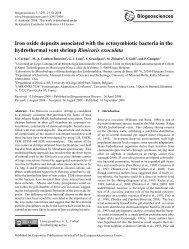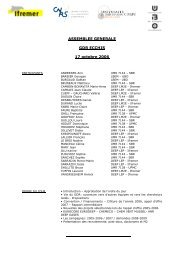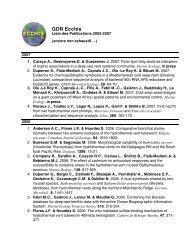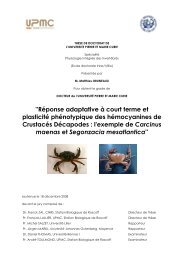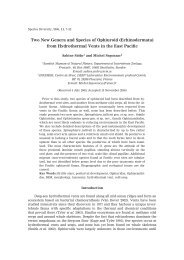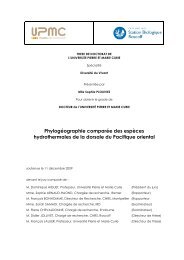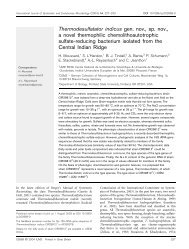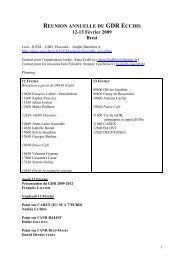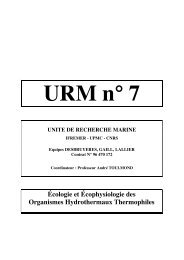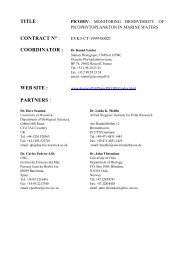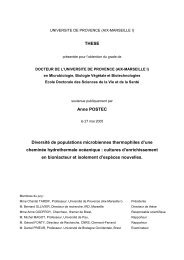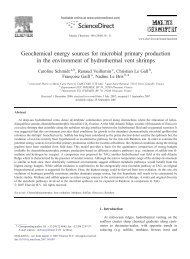European Ocean Research Fleets - uefiscdi
European Ocean Research Fleets - uefiscdi
European Ocean Research Fleets - uefiscdi
Create successful ePaper yourself
Turn your PDF publications into a flip-book with our unique Google optimized e-Paper software.
nition should be the baseline for improved operational<br />
strategies and an enhanced <strong>European</strong> cooperation in<br />
Regional seas.<br />
© FIMR<br />
Starting from the North, the 12 regions identifi ed (which<br />
may partially overlap) are:<br />
– Greenland shelves and continental breaks along<br />
Greenland’s extremely long coast line (partially overlapping<br />
with Icelandic regions)<br />
– Icelandic shelf and the Iceland Scotland Ridge<br />
– Norwegian shelf and continental breaks along the<br />
long Norwegian coast line<br />
– Baltic Sea<br />
– North Sea, English Channel and Irish Sea<br />
– Bay of Biscay<br />
– West Iberian shelf and continental break west of<br />
Portugal and Spain including the Gulf of Cadiz<br />
– Western Mediterranean from the Strait of Gibraltar to<br />
the Strait of Sicily<br />
– Eastern Mediterranean from the Strait of Sicily to the<br />
Straits of Dardanelles<br />
– Black Sea and connecting belts to the Mediterranean<br />
– Canary Islands<br />
– Azores and Madeira archipelagos.<br />
Extracting information from Appendix 1 page 39, Regional<br />
class vessels are allocated to their region where<br />
they are known (or expected) to perform their major<br />
work (Table 2).<br />
Despite its uncertainties, Table 2 presents some interesting<br />
aspects as follows:<br />
– Within the scope of the defi nition, the two regions<br />
that do not host Regional class vessels at all (Greenland<br />
and the Canary Islands), are at the same time,<br />
open ocean areas. It is therefore suggested that<br />
research in these areas is probably covered by<br />
<strong>Ocean</strong> class ships.<br />
Number of Regional RVs<br />
9<br />
8<br />
7<br />
6<br />
5<br />
4<br />
3<br />
2<br />
1<br />
0<br />
0-5 5-10 10-15 15-20 >20 years<br />
Figure 3: Age of the <strong>European</strong> Regional research fleets<br />
in 2005<br />
RV Aranda, a Regional <strong>Research</strong> Vessel in the Baltic Sea<br />
– The average age of the Regional class ships in<br />
2005 is 19 years. This figure already exceeds the<br />
nominal average age of 15 years by more than 30%<br />
(see Section A1.3). Only three of the 20 Regional<br />
class ships are less than 10 years old (RV Universitatis,<br />
RV Prince Madog, RV Celtic Voyager), but almost<br />
half of the Regional class fleet (nine ships) is at<br />
least 20 years old at least. In only two regions, the<br />
average age is slightly less than the nominal average<br />
age of 15 years because two ships involved are<br />
quite recently built: the <strong>European</strong> Regional class fl eet<br />
is quickly ageing.<br />
– The average number of days per year used for<br />
academic research is 141 days: one month being<br />
the minimum and about 270 days the maximum.<br />
Reasons may be diverse: in Northern countries for<br />
instance, a spare time of less than 60 days may be<br />
simply interpreted as winter time. It is also possible<br />
that some Regional vessels are used for other purposes<br />
such as education and training of students or<br />
monitoring. Four vessels at least could be used for<br />
two months or more per year if funding were available:<br />
the rather new RV Prince Madog (100 days) and<br />
RV Celtic Voyager (60 days) in the Celtic Seas, the old<br />
but refitted RV Mare Nigrum (100 days) in the Black<br />
Sea, and the rather old RV Garcia del Cid (100 days)<br />
in the Western Mediterranean.<br />
The above findings clearly require rapid reaction<br />
and political decisions in order to maintain regional<br />
focused research with high quality standards.<br />
There is:<br />
– a need to detail identification of lack of funding<br />
for running costs for existing but unused valuable<br />
infrastructure;<br />
– a need to take decisions to build new <strong>Research</strong><br />
Vessels in the Regional class in all regions.<br />
<strong>European</strong> <strong>Ocean</strong> <strong>Research</strong> <strong>Fleets</strong> | 17



